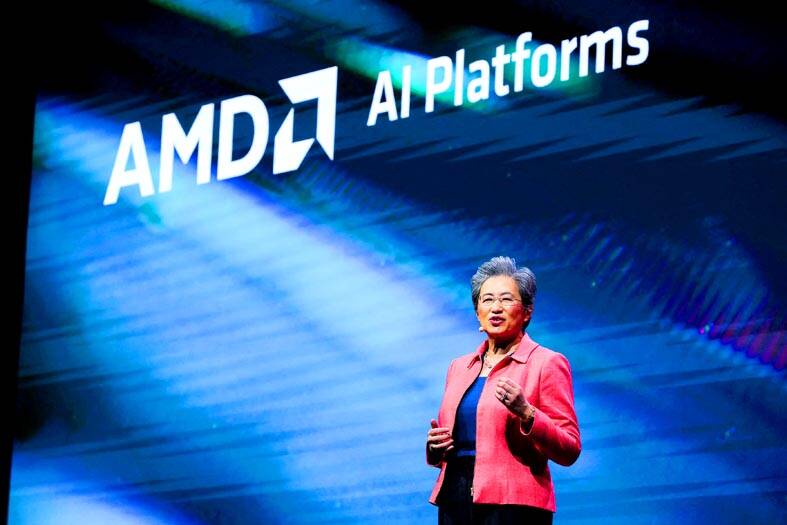Advanced Micro Devices Inc (AMD), Nvidia Corp’s nearest rival in artificial intelligence (AI) chips, predicted accelerating sales growth over the next five years, driven by strong demand for its data center products.
Annual revenue growth would average more than 35 percent over the next three to five years, AMD chief executive officer Lisa Su (蘇姿丰) said on Tuesday at a company event in New York.
AMD’s AI data center revenue would increase by an average of 80 percent over the same period, she said.

Photo: Ann Wang, Reuters
AMD shares rallied in extended trading after executives also said adjusted profit would reach more than US$20 a share and operating margin would exceed 35 percent in that time frame.
AMD updated investors on its long-term outlook amid increasing concern that the massive spending on new computer systems for AI work cannot continue at the current elevated levels.
The chipmaker’s stock has almost doubled this year, helped by agreements signed with companies including OpenAI and Oracle Corp.
The biggest owners of data center are increasing their budgets for new gear as they see “real value in their business” for AI, Su told her audience.
“The rate and pace of change in AI is certainly beyond anything that I’ve seen,” Su said.
The biggest data center owners last year were predicting a slowing of the build-out, but Su said they are telling her they are going to accelerate the pace of investment.
“It’s not going to level off,” she said.
The total AI chip market, including accelerators, processors and networking products, would reach US$1 trillion by 2030, Su said.
The chipmaker’s recent agreements with OpenAI, Oracle and the US Department of Energy reflect increased interest in its MI series of AI accelerators. Those products, which go head-to-head with chips from Nvidia, are used in data centers to create and run AI services.
AMD’s leader was asked about concerns that OpenAI might not be able to fund the huge amount of spending that it has laid out.
She said that AMD’s deal with the ChatGPT developer is structured in a very disciplined way.
While the start-up is the most aggressive forecaster of future AI computing requirements, if projections for AI user growth and revenue pan out, there would be plenty of funding available, Su said.
“I wouldn’t bet against them,” she said.
For AMD’s long-range forecast, analysts, on average, estimated sales growth of 32 percent this year followed by expansions of 31 percent next year and 39 percent in 2027, according to data compiled by Bloomberg.
Analysts projected the company’s annual growth would slow later in the decade to 20 percent in 2028 and 12 percent in the following year.

PERSISTENT RUMORS: Nvidia’s CEO said the firm is not in talks to sell AI chips to China, but he would welcome a change in US policy barring the activity Nvidia Corp CEO Jensen Huang (黃仁勳) said his company is not in discussions to sell its Blackwell artificial intelligence (AI) chips to Chinese firms, waving off speculation it is trying to engineer a return to the world’s largest semiconductor market. Huang, who arrived in Taiwan yesterday ahead of meetings with longtime partner Taiwan Semiconductor Manufacturing Co (TSMC, 台積電), took the opportunity to clarify recent comments about the US-China AI race. The Nvidia head caused a stir in an interview this week with the Financial Times, in which he was quoted as saying “China will win” the AI race. Huang yesterday said

Nissan Motor Co has agreed to sell its global headquarters in Yokohama for ¥97 billion (US$630 million) to a group sponsored by Taiwanese autoparts maker Minth Group (敏實集團), as the struggling automaker seeks to shore up its financial position. The acquisition is led by a special purchase company managed by KJR Management Ltd, a Japanese real-estate unit of private equity giant KKR & Co, people familiar with the matter said. KJR said it would act as asset manager together with Mizuho Real Estate Management Co. Nissan is undergoing a broad cost-cutting campaign by eliminating jobs and shuttering plants as it grapples

Japanese technology giant Softbank Group Corp said Tuesday it has sold its stake in Nvidia Corp, raising US$5.8 billion to pour into other investments. It also reported its profit nearly tripled in the first half of this fiscal year from a year earlier. Tokyo-based Softbank said it sold the stake in Silicon Vally-based Nvidia last month, a move that reflects its shift in focus to OpenAI, owner of the artificial intelligence (AI) chatbot ChatGPT. Softbank reported its profit in the April-to-September period soared to about 2.5 trillion yen (about US$13 billion). Its sales for the six month period rose 7.7 percent year-on-year

MORE WEIGHT: The national weighting was raised in one index while holding steady in two others, while several companies rose or fell in prominence MSCI Inc, a global index provider, has raised Taiwan’s weighting in one of its major indices and left the country’s weighting unchanged in two other indices after a regular index review. In a statement released on Thursday, MSCI said it has upgraded Taiwan’s weighting in the MSCI All-Country World Index by 0.02 percentage points to 2.25 percent, while maintaining the weighting in the MSCI Emerging Markets Index, the most closely watched by foreign institutional investors, at 20.46 percent. Additionally, the index provider has left Taiwan’s weighting in the MSCI All-Country Asia ex-Japan Index unchanged at 23.15 percent. The latest index adjustments are to